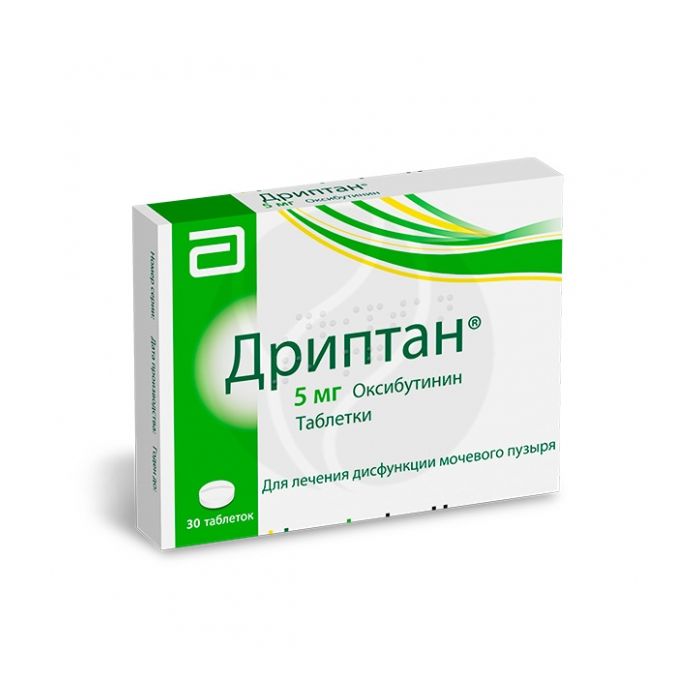Driptan tablets 5mg, # 30
Expiration Date: 11/2025
Russian Pharmacy name:
Дриптан таблетки 5мг, №30
Urinary incontinence due to instability of the bladder function of a neurogenic nature (hyperreflexia of the detrusor, for example, in multiple sclerosis or spina bifida) or idiopathic in nature;
nocturnal enuresis in children over 5 years of age (as monotherapy or in combination with other drugs).
It is taken internally. Adults - 5 mg 2-3 times / day. In elderly patients, at the beginning of treatment, 2.5-3 mg is used 2 times / day, then, if necessary, the dose is gradually increased to 5 mg 2 times / day.
Children over 5 years old - an initial dose of 2.5-3 mg 2 times / day, if necessary, gradually increase the dose to 5 mg 2-3 times / day. For nocturnal enuresis, the last dose should be taken just before bedtime.
Tablets are white, round, biconvex, scored on one side
Active substance:
oxybutynin hydrochloride
Violation of the outflow of urine from the bladder, when precipitation of retained urine is possible;
intestinal obstruction;
intestinal atony;
severe ulcerative colitis;
expansion of the colon;
myasthenia gravis;
glaucoma;
lactation (breastfeeding);
children under 5 years of age;
hypersensitivity to oxybutynin.
Application during pregnancy and lactation
During pregnancy, oxybutynin is used only for strict indications, when the expected benefit to the mother outweighs the potential risk to the fetus.
Oxybutynin is contraindicated during lactation (breastfeeding).
pharmachologic effect
M-anticholinergic from the group of tertiary amines. Along with moderate m-anticholinergic activity, it has the ability to directly affect the smooth muscles of internal organs (myotropic antispasmodic effect). Eliminates spasms and lowers the tone of smooth muscles of internal organs: gastrointestinal tract, biliary tract, uterus, urinary tract, incl. Bladder. With a neurogenic bladder, oxybutynin relaxes the detrusor of the bladder, reduces spontaneous contractions of the detrusor, increases the capacity of the bladder, and reduces the frequency of urge to urinate.
Indications of the active substances of the drug DriptanЃ
Urinary incontinence due to instability of the bladder function of a neurogenic nature (hyperreflexia of the detrusor, for example, in multiple sclerosis or spina bifida) or idiopathic in nature;
nocturnal enuresis in children over 5 years of age (as monotherapy or in combination with other drugs).
Dosage regimen
It is taken internally. Adults - 5 mg 2-3 times / day. In elderly patients, at the beginning of treatment, 2.5-3 mg is used 2 times / day, then, if necessary, the dose is gradually increased to 5 mg 2 times / day.
Children over 5 years old - an initial dose of 2.5-3 mg 2 times / day, if necessary, gradually increase the dose to 5 mg 2-3 times / day. For nocturnal enuresis, the last dose should be taken just before bedtime.
Side effect
From the digestive system: possible dry mouth, nausea, constipation, discomfort in the abdominal region, diarrhea.
From the side of the central nervous system: possible headache, drowsiness, dizziness, decreased visual acuity.
Dermatological reactions: dryness of the skin is possible.
Others: possible hot flashes (more often in children), difficulty urinating, urinary retention, arrhythmias.
Contraindications for use
Violation of the outflow of urine from the bladder, when precipitation of retained urine is possible;
intestinal obstruction;
intestinal atony;
severe ulcerative colitis;
expansion of the colon;
myasthenia gravis;
glaucoma;
lactation (breastfeeding);
children under 5 years of age;
hypersensitivity to oxybutynin.
Application during pregnancy and lactation
During pregnancy, oxybutynin is used only for strict indications, when the expected benefit to the mother outweighs the potential risk to the fetus.
Oxybutynin is contraindicated during lactation (breastfeeding).
Application for violations of liver function
Use with caution for violations of liver function.
Application for impaired renal function
Use with caution in case of impaired renal function.
Application in children
Contraindicated in children under 5 years of age.
Use in elderly patients
Use with caution in elderly patients.
special instructions
Use with caution in elderly patients, with NCD, impaired liver or kidney function, thyrotoxicosis, arrhythmias, coronary artery disease, chronic heart failure, arterial hypertension, initial manifestations of benign prostatic hyperplasia, NUC, in patients with ileostomy, colostomy, and esophageal hernia. the opening of the diaphragm, accompanied by reflux esophagitis.
Influence on the ability to drive vehicles and use mechanisms
It is used with caution in patients whose activities require increased concentration of attention, high speed of psychomotor reactions.
Drug interactions
With simultaneous use with drugs that have an anticholinergic effect, it is possible to increase it.
With the simultaneous use of itraconazole increases the concentration of oxybutynin in the blood plasma.

